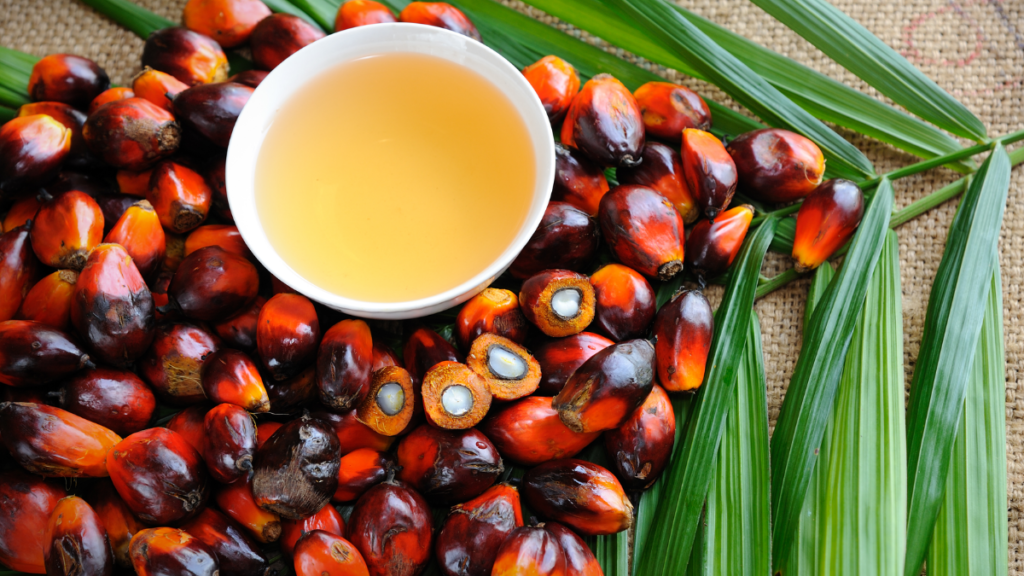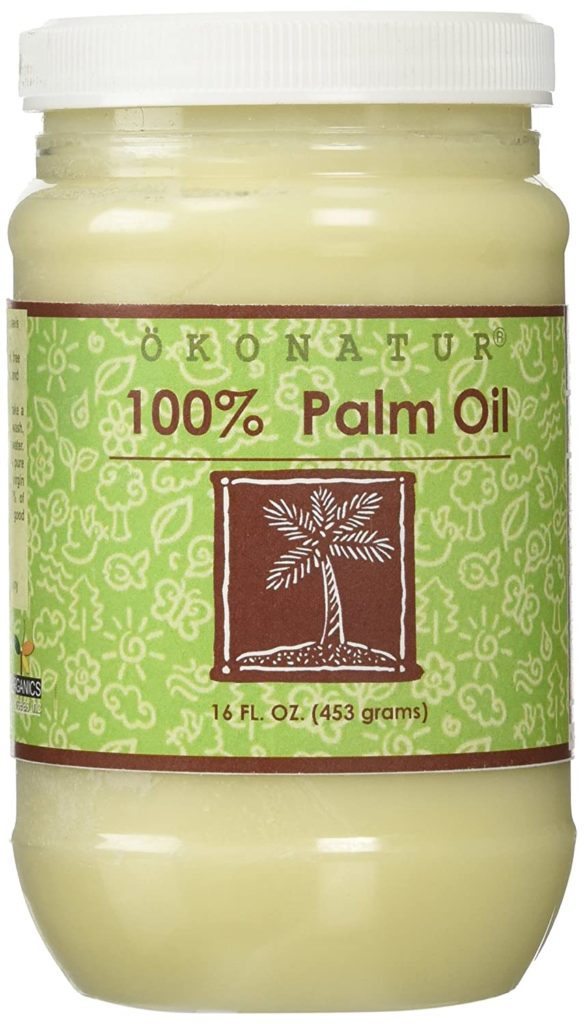Palm oil is made from the fruit of the African oil palm. It has been a necessary form of oil for millennia, but it has become one of the world’s most extensively produced oils in recent decades. This is owing to palm oil’s versatility: it’s semi-solid at room temperature so that it can be used as a spread; it’s oxidation-resistant so that it can help products last longer; and it can withstand high temperatures, making it perfect for frying.
Palm oil extraction has led to deforestation and habitat destruction for orangutans, elephants, and rhinos. The subject of palm oil production has garnered much attention in recent years. However, studies dispute whether palm oil can be beneficial to one’s health, so it’s not just the oil’s production that’s in question.
Palm Oil Nutrition Facts
Palm Oil’s Health Benefits
Palm oil contains many antioxidants, including vitamin E, and this vitamin is essential for maintaining the function of your immune system and assisting cell communication. According to studies, getting enough vitamin E in your diet can help you avoid heart disease, cancer, and age-related macular degeneration. Palm oil is high in antioxidants, but the same properties that make it beneficial can also pose issues for persons with certain medical conditions. Scientific research currently indicates the following health benefits:
Improved Mental Health
Palm oil contains vitamin E, which is linked to increased brain function. Tocotrienol, a kind of vitamin E, has been demonstrated to protect brain cells from harmful free radicals better than other antioxidants. Palm oil tocotrienols have even been shown to slow the progression of brain lesions in one study. However, more research is needed to back up these conclusions. Palm oil is high in tocotrienols, a kind of vitamin E with significant antioxidant qualities and may help brain function. Tocotrienols in palm oil may help protect the fragile polyunsaturated fats in the brain.
According to animal and human research, it decreases dementia progression, reduces the risk of stroke, and inhibits the creation of brain lesions. In a two-year trial of 121 persons with brain lesions, those who took palm oil-derived tocotrienols twice a day stayed stable, whereas those who got a placebo saw their lesions develop. Palm oil and palm oil tocotrienols appear to provide neuroprotective effects against cognitive loss, according to a 2020 analysis of 18 animal and test-tube studies. More human research, on the other hand, is required.
Promotes the Health of the Heart
According to certain research, the vitamin E in palm oil can also help heart health. In certain cases, the antioxidant benefits of vitamin E present in palm oil appear to slow or even stop the course of heart disease. While additional research is needed to confirm this benefit, palm oil extract may benefit those suffering from heart disease. Palm oil has been linked to reducing the risk of heart disease. Although some studies have yielded conflicting results, this oil appears to positively impact heart disease risk factors, such as lowering LDL (bad) cholesterol and boosting HDL (good) cholesterol. People who ate palm oil-rich diets had lower total and LDL (bad) cholesterol levels
than those who ate diets heavy in trans fats or myristic and lauric acids, according to a major study of 51 research. The cholesterol-lowering properties of palm oil generated from a hybrid of Elaeis guineensis and Elaeis oleifera trees were investigated in a three-month study published in 2016. People in this study drank either 25 mL (2 tablespoons) of olive oil or hybrid palm oil daily. Researchers indicated that this palm oil might be dubbed “the tropical counterpart of olive oil” based on a 15% decline in LDL (bad) cholesterol in both groups. Nonetheless, it’s vital to remember that LDL (bad) cholesterol levels alone cannot predict the risk of heart disease. There are plenty more aspects to consider.
Absorption of Vitamins
Palm oil may aid in the absorption of vitamin A, which is essential for the health of your retinas and overall vision. Vitamin A is a fat-soluble vitamin, which means it requires fat in your diet to be properly absorbed. Palm oil has been demonstrated to improve your body’s ability to absorb vitamin A and possibly other fat-soluble vitamins. Because red palm oil is high in carotenoids, which the body can convert into vitamin A, it may help people who are deficient or at risk of deficiency.
One small study found that people with cystic fibrosis, which makes it difficult to absorb fat-soluble vitamins, increased vitamin A blood levels after taking two to three tablespoons of red palm oil daily for eight weeks. Another review of nine high-quality studies found that taking two to three tablespoons of red palm oil daily for eight.
Palm Oil’s Potential Hazards
Because palm oil is a high-nutrient food, it may cause problems for some people. Before you use palm oil in your cooking, keep the following in mind:
Increased Cholesterol Levels
While some researchers claim that palm oil lowers cholesterol, others claim it raises “bad” cholesterol levels. This research compared palm oil to other liquid oils like olive oil and concluded that palm oil outperformed the alternatives. In one investigation, palm oil raised cholesterol levels in healthy people. Although palm oil is believed to be healthier than butter, it should not be used in place of other oils.
Is Palm Oil Better than Vegetable Oil?
When compared to vegetable oil, palm oil has much more saturated fats, and vitamin K content is three times higher than vegetable oil. , which is higher in polyunsaturated fatty acids, may be the healthier option. In a nutshell, palm oil is healthier than some culinary fats and oils, but it pales compared to vegetable oils like olive and canola oil. Some studies claim that eating palm oil as part of a healthy balanced diet does not raise the risk of heart disease, while others claim it is connected to increased rates of heart disease-related death.
Elaeis guineensis is the scientific name for edible vegetable oil from the fruit of oil palm plants. Environmentalists say that growing oil palm trees is particularly harmful to the environment. Between 1990 and 2008, palm oil extraction is claimed to have been responsible for around 8% of global deforestation. This is because forests are destroyed to allow people to plant oil palms, even though it’s against the law.
Is Palm Oil Beneficial to the Heart?
Palm oil has been demonstrated in studies to protect the heart and blood arteries from plaque formation and ischemic injury. Palm oil, when consumed as a dietary fat as part of a well-balanced diet, has no additional risk of cardiovascular disease. Palm oil is a vegetable oil that includes 50% triglycerides linked to an increased risk of stroke, heart attack, and heart disease due to artery stiffness and thickening. Because of their high content of artery-clogging saturated fats, the World Health Organization, the National Heart, Lung, and Blood Institute, the National Institute of Diabetes and Digestive and Kidney Diseases, and the USDA’s
Agricultural Research Service all advises against consuming palm oil and other tropical oils. Palm oil contains a significant amount of saturated fat, which is bad for your heart. However, one study indicated that “palm oil does not have an incremental risk for cardiovascular disease when ingested as a balanced diet.”Healthy fats, vitamins, and antioxidants abound in palm oil. Even though it can be a nutritious element of one’s diet, some people prefer to limit it or consume only sustainably cultivated palm oil because of the industry’s environmental and human rights violations.
Is Palm Oil Beneficial to Diabetics?
Palm oil contains a high concentration of antioxidants, making it advantageous to diabetes patients since the antioxidants in the oil are thought to protect the body from oxidative stress-induced cellular damage. This study found that GO had superior antioxidant properties and that supplementing red palm oil and groundnut oil as an antioxidant source was advantageous in diabetics, as it lowered blood glucose and improved antioxidant status.
Insulin binds to receptors on the surface of our cells and tells the cell membrane to open, allowing glucose to enter. However, as fat builds up inside our cells, it disrupts this signalling pathway, allowing glucose to circulate in our bloodstream and raise blood sugar levels. Recent research has found that eating a diet rich in olive oil helps prevent diabetes by lowering glucose levels, LDL (low-density lipoprotein), and triglycerides. Olive oil reduces the number of common disorders in diabetic individuals due to its cholesterol-lowering properties.
Is Palm Oil Good for Weight Loss?
The oil palm tree’s fruit is used to make palm oil. Palm oil is used to treat malaria, high blood pressure, high cholesterol, and cyanide poisoning and prevent vitamin A deficiency, cancer, brain disease, and aging. Palm oil is used to help people lose weight and speed up their metabolism. Palm oil is high in monounsaturated and polyunsaturated fats, both of which are recognized to be healthy. When it comes to cooking oils, palm oil is usually the most divisive, both in health and the environment. Palm oil is a vegetable oil extracted from the fruit of the African oil palm tree.
Coconut oil, on the other hand, is higher in minerals. In comparison, palm oil is higher in vitamin E and vitamin K. Due to its reduced saturated fat level, and research suggests that palm oil is a better choice for cardiovascular health than coconut oil. Both can be beneficial to persons who have type 2 diabetes. It’s safe to assume that you use or consume palm oil products daily. This product, however, has been linked to an increased risk of cancer. Palm oil can cause cancer when produced at high temperatures, according to the European Food Safety Authority (EFSA).
Is Palm Oil Good for a Low-Carb Diet?
Palm oil is a keto-friendly, carb-free oil! It’s high in antioxidants and monounsaturated fatty acids, making it a nutritious keto cooking oil. The high smoke point of palm oil makes it great for grilling, frying, and sautéing your favourite keto meats! Olive, avocado, and coconut oil are the finest cooking oils for the keto diet. Animal fats such as butter, ghee, lard, and tallow are excellent choices.
Olive oil is a heart-healthy cooking oil made entirely of natural ingredients. There are no carbohydrates in it at all. Olive oil is high in disease-fighting antioxidants and other health-promoting bioactive substances. Palm oil is a vegetable oil produced from the fruits of the African (and occasionally American) oil palm tree. To make palm oil, these trees produce hundreds of small orange-red fruits that are squished, pressed, and pulped.
Conclusion
Palm oil is derived from the oil palm’s fleshy fruit. Because of its reddish-orange colour, unrefined palm oil is frequently referred to as red palm oil. The Elaeis guineensis tree, which is endemic to the coastal regions of West and Southwest Africa, including Angola, Gabon, Liberia, Sierra Leone, Nigeria, and others, is the primary source of palm oil. It’s been used in these areas for a long time. Elaeis oleifera, a related oil palm, is found in South America and rarely farmed commercially. However, in the manufacture of palm oil, a hybrid of the two species is sometimes used.
Oil palm plantations have been expanding across Southeast Asia in recent years, especially in Malaysia and Indonesia. Currently, these two countries produce more than 80% of the world’s palm oil. Palm oil is presently one of the most affordable and widely used oils, accounting for one-third of all plant oil output. However, it’s crucial to note that palm oil and palm kernel oil are not the same things. Palm kernel oil is derived from the fruit’s seed, though both come from the same plant. It has a variety of health benefits.




